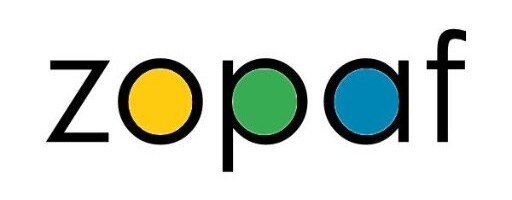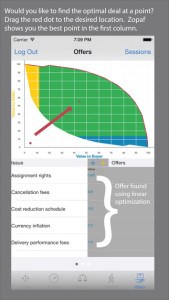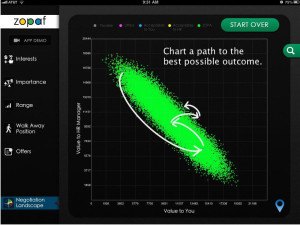Zopaf: Stop Leaving Money on the Negotiating Table

Zopaf is helping companies and individuals approach negotiations based on data instead of conventional wisdom.
Zopaf brings data to the negotiation process. A play on the negotiating acronym ZOPA (Zone of Possible Agreement), zopaf helps negotiators “see things they couldn’t see before with the help of modeling techniques, linear optimization, machine learning, and big data.” According to zopaf, both parties leave 5-15% of the value of the negotiation on the table. Zopaf is growing its offerings, but currently is offering products for everything from salary negotiations to supplier contract negotiations.
Zopaf provides you the ability to use modeling to predict outcomes based on how the process has gone so far, helps you identify potential trade-offs to increase not only your results, but also the overall pie you are negotiating for. It is iteratively learning from previous offers and providing a road map to help discover the motivations and preferences of your counter-party.
https://www.youtube.com/watch?v=bVzhkF4oGBk
There are few competitors that can do similar things live. Many salary negotiation-specific guides and popular book, have been published on negotiation, however they do not iteratively adjust to your particular situation and previous offers. There is academic research, which is taught to students at business and law schools and published in journals, which zopaf used to create the initial technology. Through machine learning, the simulations and suggestions are always learning and improving, and no major competitor that I am aware of has that to offer.
Zopaf is free to students with a current .edu email. For non-students, the service is $50 / month with a customization option available for customers willing to pay more (presumably primarily corporate customers with complex negotiations.
For zopaf, the business model and use of data are heavily intertwined. Zopaf uses data analytics, machine learning, and more to finally get the answer to the two big questions in negotiations:
How can I figure out what the other person cares about?
Can I do better?
 Zopaf initially offered only a negotiation map. Through entering your preferences and ranges and running a Monte Carlo simulation, zopaf calculated 80,000 possible scenarios, then with linear optimization and machine learning, you can tease out what the other party seems to care about, potential counter-moves, and instead of 80,000 scenarios you then have a few more tailored, data-based options, ones specifically designed to learn from a series of offers what your counter-party cares about. Of course you are not stuck with those options, and each time you enter a
Zopaf initially offered only a negotiation map. Through entering your preferences and ranges and running a Monte Carlo simulation, zopaf calculated 80,000 possible scenarios, then with linear optimization and machine learning, you can tease out what the other party seems to care about, potential counter-moves, and instead of 80,000 scenarios you then have a few more tailored, data-based options, ones specifically designed to learn from a series of offers what your counter-party cares about. Of course you are not stuck with those options, and each time you enter a
nother offer in the negotiation zopaf is learning from you.
Zopaf will not replace the need to read the room, interpret facial expressions, talk to your counter-party, or execution of gimmicky tactics. Zopaf will provide you a tailored road map based on your preferences and those of your counterparts, one that learns as the negotiation progresses, and help you ensure that you are using the latest research available to create value in a negotiation. You can even evaluate counter-offers and scenarios discreetly under the table during a live negotiation.
Zopaf will continue to grow as it expands negotiation types. They went after the largest market first – job negotiations. Now that they have seen success, they are expanding into more lucrative markets that have a greater need for the tool on a reoccurring basis, such as procurement contracts. As they grow, they will need to develop new products designed for different types of negotiations. Before the new products are robust, they will need large amounts of data to create hypothesis and algorithms applicable to many different scenarios. Each expansion into a new type of negotiation will take time, data, and money. Time will tell of zopaf can overcome those barriers.
The last barrier is those who do not believe the fundamental theories the technology is based on. From Machiavelli to The Art of the Deal, the conventional wisdom for centuries has been that power, competitiveness, and sometimes even gimmicky tactics are the only way to win at negotiations. For those who do not believe the theories, observations, and fundamentals zopaf is based on, zopaf will be a tough sell. As more negotiators use data to make decisions, and are successful, perhaps success will be zopaf’s biggest marketing tactic. But then again, you almost never really know without data if you won or lost a negotiation. Unless you are using zopaf.
https://www.freelancersunion.org/blog/2014/09/11/are-you-leaving-money-table/
http://www.prweb.com/releases/2013/4/prweb10682514.htm
http://www.geekazine.com/special/zopaf-salary-negotiation-calculator-app-disrupt-2014/



This is such a cool tool! Will definitely check it out at some point.
One limitation of this I am interested in is that it really depends on the users to set the input. Therefore, if the users are not fully aware of the situation they are in, then we will run into a situation that’s “garbage in, garbage out”. It would be interesting to see how Zopaf tackles that in the future.
Great post, thank you for sharing. This is a field where we need more data analytics. Do you think it’s the winner takes all market? I would assume there would be multiple firms in the future that deal with certain types of contracts. Being first mover certainly brings advantages. One thing I as worrying about is data privacy. Would many users be willing to give up sensitive details? Would non-disclosure clauses include services like this one?
Really interesting post! What I wonder about with this technology is track record and accuracy. I feel like, especially as the company moves away from job negotiations and toward other types of negotiations, that it can be incredibly difficult to model irrational human behavior. So much of individuals’ moves in a negotiation can be irrational and stemming from emotions, so I’m quite curious how the technology will accurately be able to predict human, emotional reactions
Thanks you for the insightful article. I did not realize that such a service existed to help individuals better craft negotiation strategies. While Jnternet technology is a clear key component of this business, I am unconvinced that it provides a competitive advantage. Particularly, I am inclined to believe that potential consumers could find relevant information online for free. I am interested in how the company chooses to differentiate itself to procure a sustainable revenue stream.